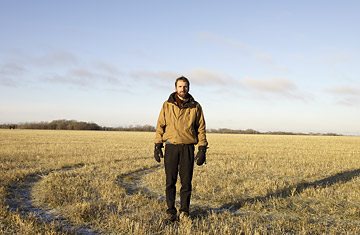
In Minnesota, Daniel Wolpert pastors a conventional, aging congregation but also runs a contemplation center on a plot of former farmland.
Carol Porter, 63 and no word mincer, sits in her modest kitchen in Euclid, Minn., and recalls the day her 118-year-old church was burned to the ground. "I was baptized, confirmed and married there," she reports. Her family had moved two lots down from Euclid's First Presbyterian, so she was able to watch through the kitchen window a few years ago as fellow parishioners knocked down the church, buried its fixtures and then put a match to what remained, sending a thousand Sundays of memories up in smoke.
America's rural congregations, thinned by age and a population drain that plagues much of farm country, have gotten too small and too poor to attract pastors. No pastor means no church. And losing one's church--well, Porter has a vivid memory of that, living as she does in an area where abandoned buildings are control-burned for safety. The flames were taller than a man, she remembers. "In plain English," she says, "it looked like hell."
The ticktock of farm auctions and foreclosures in the heartland, punctuated by the occasional suicide, has seldom let up since the 1980s. But one of the malaise's most excruciating aspects is regularly overlooked: rural pastors are disappearing even faster than the general population, leaving graying congregations helpless in their time of greatest need. Trace Haythorn, president of the nonprofit Fund for Theological Education (FTE), says fewer than half the rural churches in the U.S. have a full-time seminary-trained pastor; in parts of the Midwest, the figure drops to 1 in 5. "It's a religious crisis, for sure," says Daniel Wolpert, pastor of First Presbyterian in Crookston, Minn., and a partner with the FTE, which supports young ministers and religious teachers. "And to the extent that these churches are anchoring institutions, it's a crisis of community." The sign for one lovely wood-framed church in nearby Buxton, N.D., says it all: GRUE LUTHERAN CHURCH. FOUNDED SINCE 1879. PASTOR--and then a blank where a name should be.
Why are the pastors disappearing? Mainline churches (as well as some Evangelical) prefer their ministers seminary trained. But the starting salary for debt-burdened seminary grads now runs to $35,000 a year. That can break a poor and aging congregation, says Elizabeth Rickert Dowdy, pastor of the Tar Wallet Baptist Church in Cumberland, Va., who recently helped disband her other church: "When you have a congregation that's historically been able to survive at 20 members and loses 12, they close." And for the first time in American history, the majority of seminarians don't come from rural areas. Shannon Jung, a rural-church expert in Kansas City, Mo., says of young pastors, "A town without a Starbucks scares them." Wolpert recalls a professor's warning to a promising seminarian to shun a rural call: "Don't go. You're too creative for that."
